The House of Representatives approved the 2022 budget, which includes two additional salaries for teachers and all public sector employees. The Minister of Education promised financial incentives ($130) from donors (UNICEF) for those working in the education sector. However, the academic year will not officially start today in secondary schools, apart from some violations, despite the Minister's promises that October 3 would be the first day of teaching in the public education system. In his recent meeting with unions representing public education, the minister went further by telling those "who are dissatisfied with the incentives to resign." No one from the attending "unionists" replied to him, and they continued their meeting as if the dignity of education were still intact.
Those following educational affairs hear the promises and hopes; every statement starts with "We will hold, we will follow up, we will try, we will pay...". These same phrases were used to express the expected provisions to kick off the current academic year in public education, so the educational offices were convinced, prompting the unions to agree, until the minister's recent television interview, in which he mentioned a "gap in funding for teachers' incentives that has yet to be secured," adding, "We will work to secure it," which has complicated all calculations.
In turn, the teachers have reached the equation of "a promise for a promise, and an action for an action." They are now asking, "How can we return to education when the budget has not yet been approved, and there are no confirmations that the financial incentives will be paid at the start of the academic year?" They add, "Those who have burnt themselves with milk blow on the yogurt." The state has not yet paid the transportation fees for the last academic year, nor the assistance (half-salary) for the months of April, May, and June, in addition to incentives for some teachers. Unionists point out that the budget is "unclear, and there is a problem with the amount of allocated funds," fearing "the absence of retroactive effect; what if its approval is delayed further or is not approved at all, we would have been teaching on a salary that is not enough to reach secondary schools."
Educational offices deal with teachers and secondary schools as if all promises have been converted into money in the accounts, and it remains only for teachers to resume their work. Some members of the administrative body are attempting to fulfill their parties' agendas while bypassing the general assemblies, either by pushing for not holding them at all and proceeding with teaching and opening secondary schools where possible, to create pressure on "those refusing to return," or by "obfuscating and diluting" the recommendations issued by the administrative body, based on which the assemblies convene, leading to their non-implementation on the ground. This has led to disagreements within the administrative body, between party representatives, some advocating for teaching starting this Monday and "that's that," and others wanting to save face only by calling for general assemblies.
"Al-Akhbar" learned that the "vagueness" of the recommendations lies in their not including a clause on "refusing to return," but rather focusing on two clauses: "teaching for 4 days or 3 days," knowing that the Ministry of Education, in its last circular, allowed teachers to "limit their teaching load to 3 days" since teaching will be for 4 days a week, and it reduced the weekly teaching load from 20 hours to 18.
Accordingly, these offices are working "piece by piece" with the directors. In some southern districts, teaching will start today with half-days, and there is a trend among some secondary schools not to fully comply with the decisions of the Secondary Education Association, and educational programs have been set that do not even consider the reduction in the weekly load. This trend is being reinforced by fundraising efforts, such as "fuel for cars" provided by a local MP for teachers from expatriates in the Bent Jbeil area, which has left many of them confused, especially since the distribution of the "donation" will not be by the state, but by party-affiliated entities. Alongside the incentives, intimidation has also surfaced, such as in Baabda, where one educational office offered a "team" to help with registration in place of teachers.




